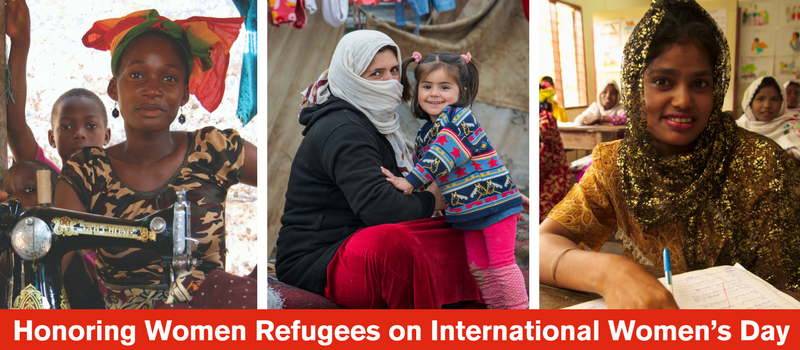International Women’s Day, is a global celebration of women everywhere. It is a rallying call—both for reflection on how far we’ve come, and for accelerating momentum towards gender equality. Core to achieving our agenda is the prevention of all forms of violence against women. Despite notable progress over the decades, thousands of women have recently been dealt a serious and potentially deadly setback: The women who are refugees and asylum seekers looking to the U.S. for safety and protection.
Violence against women is still endemic, and this is particularly the case in humanitarian crises. It cannot be overstated: Women who are fleeing conflict and persecution face heightened risks of gender-based violence, including sexual assault, early and forced marriage, female genital cutting, trafficking and exploitation. Such pervasive violence incurs very high costs for individual women, their families, and their communities. It stymies progress to achieving gender equality and internationally agreed upon development goals.
On the campaign trail, President Trump promised to “protect women” and stated, “I love women. I respect women. I cherish women.”
I beg to differ on at least five fronts:
1. The ban on travel
The recent Executive Order, which blocks nationals from six Muslim majority countries, and continues the suspension of refugee settlement in the U.S. for 120 days, is harmful to the women it purports to protect. In the EO, violence against women is included as a focus of data collection in order to review and implement more “policies and practices that serve the national interest.” But suspending the entry of thousands of asylum seekers—70 percent of whom are women and children—leaves them in situations where they are exposed to unacceptably high-risk for gender-based violence. Not only does the U.S. travel ban slam the door in the face of women who have experienced violence while fleeing, but the EO exposes them to more potential incidents of violence while they are warehoused in poorly resourced camps and detention centers while waiting resettlement.
2. Increasing deportations result in more family separations
Trump has vowed to increase deportations of undocumented immigrants, which will result in more women and children being separated. As reported by Reuters on Friday, The Department of Homeland Security (DHS) is considering a proposal that would separate women and children arriving at the border without documentation in order to deter mothers from migrating with their children in tow. At present, the majority of families awaiting asylum are detained for a few weeks where they are processed and have to pass a “credible fear” interview before being released for the remainder of their legal proceedings. This proposal, however, would immediately detain parents and move children into separate shelters and detention centers where they would go through proceedings alone.
This is a harrowing proposition. Separating children from their mothers at the border will deeply traumatize families and drive them further underground. The forced separation of mothers and children is cruel, inhumane, and runs counter to international principles of family unity and health.
3. Forcing women into the shadows
The most recent EO sends a dangerous message to women, namely that asking for help will likely result in deportation. Women will not report incidents of domestic violence or sexual assault if it will result in them being forcibly removed from the country. Last month, federal immigration agents went to a courthouse in Austin, Texas and arrested an undocumented woman who had just received a protective order for being a victim of domestic violence. Furthermore, creating more immigration restrictions will force desperate women and children asylum seekers into the hands of smugglers, traffickers, and drug cartels.
4. Robbing women of their legal rights
All individuals have the right to seek asylum when they present at the U.S. border. Recently some WRC staff visited the Mexican-American border, and heard numerous tales of people being turned away at the border. This is in direct violation of U.S. law. Additionally, expedited removals rob immigrants of their right to due process as guaranteed by the Constitution. The WRC staff recently spoke to a women seeking asylum from Central America who was turned away at the border and was kidnapped by gang members just a few minutes later while crossing back over the U.S. port of entry bridge.
5. Cuts in funding
The U.S. is undoubtedly one of the biggest donors of foreign aid but this represents just 1% of the nation’s gross national income, a very low percentage when compared to the contributions of many western countries. Cuts in foreign aid will directly hurt women. We’re already seeing this with the reinstatement of the Global Gag Rule, which forces foreign organizations to choose between accepting U.S. funding or providing critical access and information on reproductive health care to tens of millions of women around the world.
In the past, the negative impact of the Global Gag Rule has been broad and severe: clinics that provide a basic, lifesaving maternal and child health care services have been forced to close; and access to contraceptives were severely limited, resulting in more unintended pregnancies and more unsafe abortions.
We understand the need for enforceable and clear immigration policies, but Trump’s measures are tantamount to state-sanctioned violence against women and children. And we fear a ripple effect, resulting in other countries deporting refugees and asylum seekers, and closing their doors to women and children fleeing violence and persecution.
On International Women’s Day let’s recommit to making the world a safer place for women so they can support their families and communities. Investing in women’s equality and rights is the most effective way to achieve peace and security in the world.
President Trump, you promised that you would protect women. This is one campaign promise you haven’t kept.


